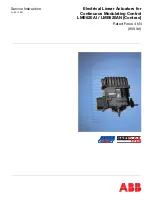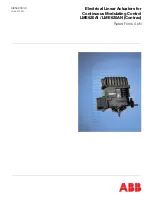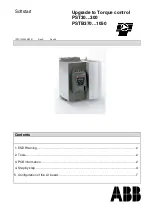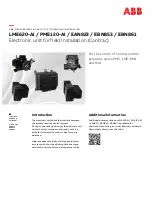
AUBER INSTRUMENTS
WWW.AUBERINS.COM
2017.10
P2/3
Table 1. Parameters Description
Code
Description
Setting Range
Initial Note
Menu for set point (Figure 2)
tSP
tSP
Temp. Set Point
-40~176 ºF
-40~80 ºC
75.0
1
HSP
HSP
Humidity Set Point
0~99.9 %RH
40.0
Menu for parameters (Figure 3)
Edt
EDT
Menu Selection
tE: Temp. Menu
Hu: Humidity Menu
SYS*: System
Menu
TE
6
Temp. control settings (Edt = tE)
C-F
C-F
Temp. Unit
C: Celsius
F: Fahrenheit
F
tCM
tCM
Temp. Control Mode
Ht: Heating Control
CL: Cooling
Control
CL
TdF
TDF
Temp. Control
Differential
0~50.0
3.0
1
toF
toF
Temp. Calibration
Offset
-10.0~10.0
0
2
tAH
TAH
Temp. High
Limit Alarm
-40~176 ºF
-40~80 ºC
95.0
3
tAL
TAL
Temp. Low
Limit Alarm
-40~176 ºF
-40~80 ºC
32.0
TAS
TAS
Temp. Anti-short
Cycle Delay (only for
cooling)
0~12 min
0
4
TSF
TSF
Temp. Sensor
Failure Operation
ON: Output
energized
OFF: Output de-
energized
OFF
5
Humidity control settings (Edt = Hu)
HCM
HCM
Humidity Control
Mode
deH:
Dehumidifying
H: Humidifying
H
HdF
HDF
Humidity Control
Differential
0~50.0
3.0
1
HoF
HoF
Humidity Calibration
Offset
-10.0~10.0
0
2
HAH
HAH
Humidity High Limit
Alarm
0~99.9
90.0
3
HAL
HAL
Humidity Low Limit
Alarm
0~99.9
10.0
HAS
HAS
Humidity Anti-short
Cycle Delay (only for
dehumidifying)
0~12 min
0
4
HSF
oFF
Humidity Sensor
Failure
operation
ON: Output
energized
OFF: Output de-
energized
OFF
5
System setting (Edt = SYS*)
PSD
PSD
Device Access
Password
100 ~ 999
666
7
SET
T
RH
tSp
5 4
.
2
T
RH
1 5
.
0
HSp
RH
T
6 8
.
9
3 6
.
8
SET
Humidity Set Point
Temp. Set Point
SET
Figure 2. Flow Chart Part 1
6 8
.
9
3 6
.
8
3 sec
T
RH
Edt
tE
T
RH
Edt
Hu
T
RH
C-F
F
T
RH
HcM
deH
T
RH
Dn
Up
6 8
.
9
3 6
.
8
T
RH
SET
SET
SET
SET
Temp.
Unit
Humidity
Control
Settings
Humidity
Control
Mode
Temp.
Control
Settings
Edt
sys
T
RH
Dn
Up
SET
System
Setting*
psd
666
T
RH
Access*
Password
SET
SET
Figure 3. Flow Chart Part 2
Note 1.
For heating (or humidifying), the output will be off when the
temperature (or humidity) reaches the set point; it will be on again when the
temperature (or humidity) drops down to tSP - tdF (or HSP - HdF).
For cooling (or dehumidifying), the output will be off when the temperature (or
humidity) reaches the set point; it will be on again when the temperature (or
humidity) rises to tSP + tdF (or HSP + HdF).
Small differential gives tight control. Large differential reduces the frequency of
cycle on and off, and it will extend the life of relay and compressor.
Note 2.
The offset is used to set an input offset to compensate the error
produced by the sensor or input signal itself.
For example, for temperature reading, if the unit displays 37 ºF when the actual
temperature is 32ºF, setting parameter toF = - 5 will make the controller display
32ºF.
Note 3.
The low limit alarm will be always lower than the high limit alarm. When
the measured temperature (humidity) is higher than tAH (HAH), the
temperature (humidity) high limit alarm will be on; when the measured
temperature (humidity) is lower than tAL (HAL), the temperature (humidity) low
limit alarm will be on.
When alarm is on, the display will be flashing between the measured value and
alarm type. To mute the alarm when it is on, press the Down key momentarily.
When the alarm is muted, the alarm indicator (see Figure 1, the small dot on
the last digit) will be on. If the measured value gets out of the alarm zone then





















